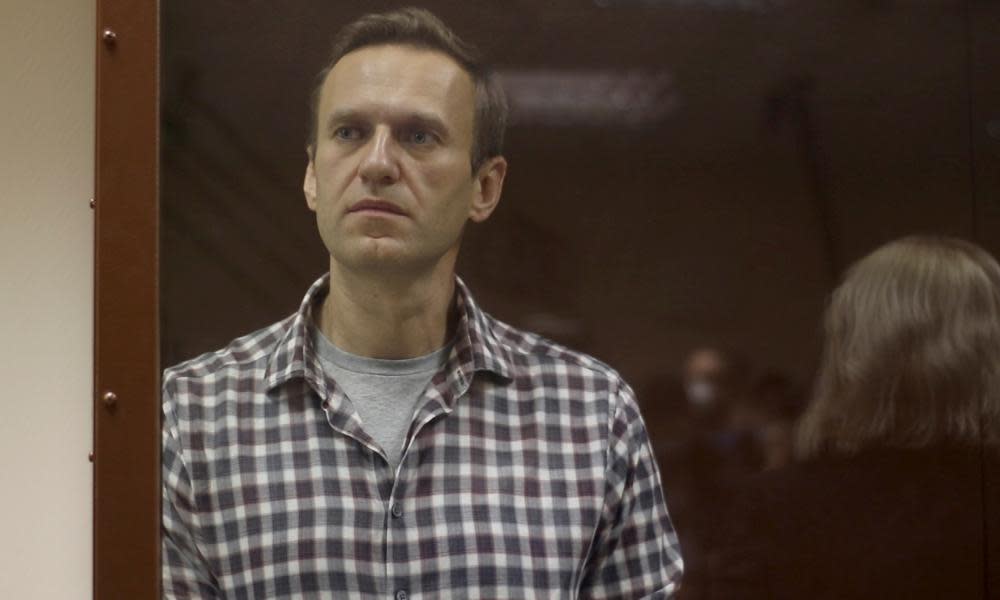Kremlin takes swipe at Navalny's reputation as he is sent to prison colony

The Kremlin is taking aim at Alexei Navalny’s reputation, as the opposition leader was sent to a prison colony in Russia, a journey into a “grey zone” where supporters say he will need maximum international support to ensure his safety.
For years Navalny was a phantom in Russian state media, his name studiously absent from the lips of top officials and news anchors. A favourite game among the opposition was to write his name on a snowbank – municipal workers would often arrive shortly after to sweep it away.
But now he has been sentenced to two and a half years in prison on embezzlement charges, the Kremlin and its supporters have highlighted his role in nationalist politics in the 2000s and used the courts to portray him as unpatriotic.
In the month since his arrest, he has been convicted of slandering a second world war veteran, a crime that did not add any time to his sentence but made for an unsavoury showpiece on primetime news shows.
And then, in what some Amnesty International employees have described as a capitulation to a “coordinated campaign”, the human rights organisation stopped describing him as a “prisoner of conscience”, a decision that allies said would relieve pressure on Russia to release him immediately.
“The key to trying to get him out is to apply the most pressure domestically … but also internationally,” said Vladimir Ashurkov, a close ally of Navalny who has called for sanctions against Russian officials and businessmen. “That the status was taken away from him so publicly, this naturally damages the reputation of Alexei … and it propagates malice and doubt and that’s what the perpetrators of this were trying to achieve.”
Amnesty has denied it was pressured into the decision, saying “propaganda by the Russian authorities is recognisable as such”. But figures such as Margarita Simonyan, the head of the state-funded RT news network, have taken a victory lap, writing that “our columnist used concrete examples that reminded everyone he [Navalny] is a Nazi”.
The decision came days before Navalny’s transfer began from a Moscow jail to a prison colony somewhere in Russia, a journey during which he will disappear for days or even weeks before his location is revealed. Russia has ignored a ruling from the European court of human rights to free him because his safety could not be ensured in a prison.
Amnesty has said it will continue to push for Navalny’s release, but supporters say its move has already done real damage. Some, like the Navalny ally Leonid Volkov, said the organisation’s leadership was “unfit”. Others said they would demand the organisation return the status to Navalny.
“What they’re trying to do is to cut out international support for him … to create doubt whether we should be supporting this guy. Is this a good guy?” said Jamison Firestone, a lawyer who had previously worked with Sergei Magnitsky, a tax lawyer who died in a Russian jail in 2009, and has pushed for sanctions against Russian officials.
At issue is whether a series of videos from the early 2000s produced by Navalny opposing migrant workers – as well as his refusal to apologise for them – should downplay the public campaign for his release from prison, which has been driven by his investigations into corruption and for leading protests against Vladimir Putin.
Amnesty has said its decision was internal and the focus on it is distracting from securing Navalny’s release. But in a phone call with a Russian prankster pretending to be Volkov, senior Amnesty officials admitted the decision had “done a lot of damage” and that “we may have done more harm than good at this time”.
Navalny began his long period of transfer to a Russian prison colony on Thursday evening in a process called etapirovaniye, where even close relatives can lose track of prisoners for days or weeks.
His lawyer, Vladimir Kobzev, said he did not know where Navalny was being sent.
Kira Yarmysh, Navalny’s longtime press secretary, said: “It’s always a grey zone when no one knows where he’s being taken or how long it will take. Neither his relatives, nor his lawyers, and even often the prisoners themselves have any information. It’s hell on its own, but in Alexei’s case, just like being in prison, it’s a threat to his life.”

 Yahoo News
Yahoo News 
